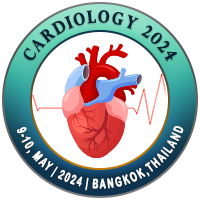
James Kim
Boston University SOM, USATitle: Relevance of History and Physical in a 21-Year-Old Immigrant with Unspecified Acute Chest Pain
Abstract
A 21-year-old male Haitian refugee who traveled across multiple Central and North American countries presented to a large urban safety net hospital for acute, pleuritic chest pain. The patient reported nightly fevers, headaches, and chills, but denied any dyspnea, orthopnea, radiating pain, loss of consciousness, or diaphoresis. On physical exam, the patient had no murmurs, rubs, or gallops, and was not in any acute distress. The chest pain was not elicited by palpation but was positional. Initial evaluations indicated severely elevated troponin levels, a bedside ECG showed normal sinus rhythm with right axis deviation, PR depression and ST elevations in leads V4-V6, and cardiac C-reactive protein levels and erythrocyte sedimentation rate were moderately elevated as well. A comprehensive metabolic panel, urinalysis, and chest plain film were unremarkable. Upon admission, cardiac MRI and CTPA were unremarkable. Overall, our objective data were unclear from elevated serum markers with positive ECG findings, but no findings on cardiac MRI and CTPA, the gold standard for diagnosing myopericarditis. However, after extensive history taking and continuous monitoring, a clinical diagnosis of myopericarditis was made calculating the diagnosis of acute myocarditis in an emergency (DAME) score. To evaluate for an infectious etiology, a work-up including TB, COVID-19, Coxsackie, and other notable cardiopulmonary disease-causing vectors resulted in negative. The patient was treated with colchicine, ibuprofen, and famotidine, and the chest pain resolved by hospital day 4. Given the resolution of symptoms and down-trending serum markers, the patient was subsequently discharged with plans for follow-up with cardiology. The patient was lost to follow-up possibly due to his refugee history and limited resources—indicating the challenges that many physicians face when treating refugees and low-resource patients. Furthermore, this case highlights the importance of extensive history and physical in clinical decision-making when objective data are contradictory with one another.
Biography
James Kim is a fourth-year medical student at Boston University Chobanian and Avedisian School of Medicine. Originally from Long Island, New York, he studied at Boston University with a degree in Medical Science and a minor in Psychology. His academic interests are in sports medicine and regenerative medicine, which he is actively doing research in. He is hoping to become an academic physician teaching the future generation of physicians in rehabilitative medicine. He has a strong love for internal medicine and physiology to explain the science of exercise.

